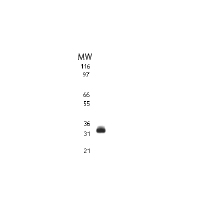TRAIL antibody (mAb) (Clone 55B709.3)
Host / Isotype
Mouse / IgG1
Reactivity
Human
Applications
WB
CloneNo.
55B709.3
Cat No : 40966 40966
Synonyms
验证数据展示
产品信息
| Tested Applications |
WB
Applications Validated by Active Motif: WB: 1 - 2 ug/ml dilution For optimal results, primary antibody incubations should be performed at room temperature. The addition of 0.1% Tween 20 to all blocking solutions may also reduce background. Individual optimization may be required. |
| Tested Reactivity | Human |
| Host / Isotype | Mouse / IgG1 |
| Class | Monoclonal |
| Type | Antibody |
| Immunogen | This TRAIL antibody was raised against a peptide corresponding to amino acid residues 17-35 of human TRAIL. |
| Full Name | TRAIL antibody (mAb) (Clone 55B709.3) |
| Synonyms | TRAIL, TNF-Related Apoptosis-Inducing Ligand, TNFSF10, CD253, Apo2L, tumor necrosis factor ligand superfamily member 10, antibody, antibodies, monoclonal, 40966 |
| Molecular weight | 32 kDa |
| GenBank accession number | NP_003801 | RRID | AB_2793462 | Purification Method | Affinity Purified |
| Buffer | PBS containing 0.02% sodium azide. Sodium azide is highly toxic. |
| Storage | Some products may be shipped at room temperature. This will not affect their stability or performance. Avoid repeated freeze/thaw cycles by aliquoting items into single-use fractions for storage at -20°C for up to 2 years. Keep all reagents on ice when not in storage. |
背景介绍
TRAIL (TNFSF10, CD253, Apo2L) is a cytokine that belongs to the tumor necrosis factor (TNF) ligand family. TRAIL is an acronym for TNF-Related Apoptosis-Inducing Ligand. Both the transmembrane and soluble recombinant forms of TRAIL can rapidly induce apoptosis in a wide variety of transformed and tumor cell lines, yet no cytotoxicity is observed with normal human cell lines, even though TRAIL and its receptors are expressed at significant levels there, and in most normal tissues in vitro. TRAIL is expressed constitutively in many tissues such as liver, lung, placenta, kidney, spleen, peripheral lymphocyte, etc. The binding of TRAIL to its receptors has been shown to trigger the activation of MAPK8/JNK, Caspase-3, and Caspase-8. TRAIL induces cancer apoptosis independently of p53 gene mutations. Two additional TRAIL decoy receptors (DcR1 and DcR2) do not trigger an apoptotic signal in normal cells and have been proposed to confer protection from TRAIL-inducing apoptosis. TRAIL may also play roles in immune responses, autoimmune disorders and HIV infection. TRAIL can interact with five different members of the TNF receptor superfamily, two of which contain a death domain, and can mediate an apoptotic response. TRAIL may also be a marker for progression of cancers.

